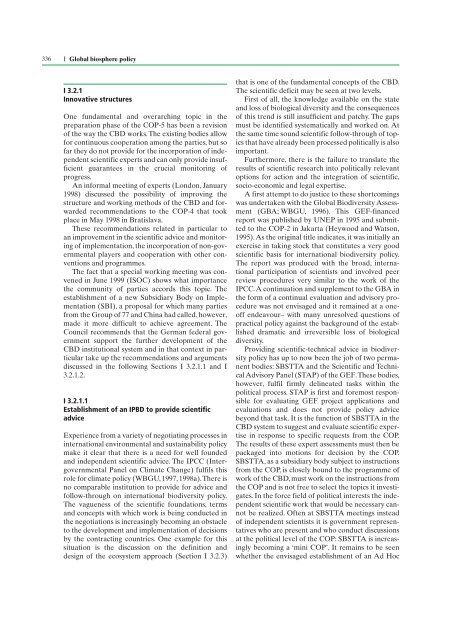Conservation and Sustainable Use of the Biosphere - WBGU
Conservation and Sustainable Use of the Biosphere - WBGU
Conservation and Sustainable Use of the Biosphere - WBGU
Create successful ePaper yourself
Turn your PDF publications into a flip-book with our unique Google optimized e-Paper software.
336 I Global biosphere policy<br />
I 3.2.1<br />
Innovative structures<br />
One fundamental <strong>and</strong> overarching topic in <strong>the</strong><br />
preparation phase <strong>of</strong> <strong>the</strong> COP-5 has been a revision<br />
<strong>of</strong> <strong>the</strong> way <strong>the</strong> CBD works. The existing bodies allow<br />
for continuous cooperation among <strong>the</strong> parties, but so<br />
far <strong>the</strong>y do not provide for <strong>the</strong> incorporation <strong>of</strong> independent<br />
scientific experts <strong>and</strong> can only provide insufficient<br />
guarantees in <strong>the</strong> crucial monitoring <strong>of</strong><br />
progress.<br />
An informal meeting <strong>of</strong> experts (London, January<br />
1998) discussed <strong>the</strong> possibility <strong>of</strong> improving <strong>the</strong><br />
structure <strong>and</strong> working methods <strong>of</strong> <strong>the</strong> CBD <strong>and</strong> forwarded<br />
recommendations to <strong>the</strong> COP-4 that took<br />
place in May 1998 in Bratislava.<br />
These recommendations related in particular to<br />
an improvement in <strong>the</strong> scientific advice <strong>and</strong> monitoring<br />
<strong>of</strong> implementation, <strong>the</strong> incorporation <strong>of</strong> non-governmental<br />
players <strong>and</strong> cooperation with o<strong>the</strong>r conventions<br />
<strong>and</strong> programmes.<br />
The fact that a special working meeting was convened<br />
in June 1999 (ISOC) shows what importance<br />
<strong>the</strong> community <strong>of</strong> parties accords this topic. The<br />
establishment <strong>of</strong> a new Subsidiary Body on Implementation<br />
(SBI), a proposal for which many parties<br />
from <strong>the</strong> Group <strong>of</strong> 77 <strong>and</strong> China had called, however,<br />
made it more difficult to achieve agreement. The<br />
Council recommends that <strong>the</strong> German federal government<br />
support <strong>the</strong> fur<strong>the</strong>r development <strong>of</strong> <strong>the</strong><br />
CBD institutional system <strong>and</strong> in that context in particular<br />
take up <strong>the</strong> recommendations <strong>and</strong> arguments<br />
discussed in <strong>the</strong> following Sections I 3.2.1.1 <strong>and</strong> I<br />
3.2.1.2.<br />
I 3.2.1.1<br />
Establishment <strong>of</strong> an IPBD to provide scientific<br />
advice<br />
Experience from a variety <strong>of</strong> negotiating processes in<br />
international environmental <strong>and</strong> sustainability policy<br />
make it clear that <strong>the</strong>re is a need for well founded<br />
<strong>and</strong> independent scientific advice. The IPCC (Intergovernmental<br />
Panel on Climate Change) fulfils this<br />
role for climate policy (<strong>WBGU</strong>, 1997, 1998a).There is<br />
no comparable institution to provide for advice <strong>and</strong><br />
follow-through on international biodiversity policy.<br />
The vagueness <strong>of</strong> <strong>the</strong> scientific foundations, terms<br />
<strong>and</strong> concepts with which work is being conducted in<br />
<strong>the</strong> negotiations is increasingly becoming an obstacle<br />
to <strong>the</strong> development <strong>and</strong> implementation <strong>of</strong> decisions<br />
by <strong>the</strong> contracting countries. One example for this<br />
situation is <strong>the</strong> discussion on <strong>the</strong> definition <strong>and</strong><br />
design <strong>of</strong> <strong>the</strong> ecosystem approach (Section I 3.2.3)<br />
that is one <strong>of</strong> <strong>the</strong> fundamental concepts <strong>of</strong> <strong>the</strong> CBD.<br />
The scientific deficit may be seen at two levels.<br />
First <strong>of</strong> all, <strong>the</strong> knowledge available on <strong>the</strong> state<br />
<strong>and</strong> loss <strong>of</strong> biological diversity <strong>and</strong> <strong>the</strong> consequences<br />
<strong>of</strong> this trend is still insufficient <strong>and</strong> patchy. The gaps<br />
must be identified systematically <strong>and</strong> worked on. At<br />
<strong>the</strong> same time sound scientific follow-through <strong>of</strong> topics<br />
that have already been processed politically is also<br />
important.<br />
Fur<strong>the</strong>rmore, <strong>the</strong>re is <strong>the</strong> failure to translate <strong>the</strong><br />
results <strong>of</strong> scientific research into politically relevant<br />
options for action <strong>and</strong> <strong>the</strong> integration <strong>of</strong> scientific,<br />
socio-economic <strong>and</strong> legal expertise.<br />
A first attempt to do justice to <strong>the</strong>se shortcomings<br />
was undertaken with <strong>the</strong> Global Biodiversity Assessment<br />
(GBA; <strong>WBGU</strong>, 1996). This GEF-financed<br />
report was published by UNEP in 1995 <strong>and</strong> submitted<br />
to <strong>the</strong> COP-2 in Jakarta (Heywood <strong>and</strong> Watson,<br />
1995).As <strong>the</strong> original title indicates, it was initially an<br />
exercise in taking stock that constitutes a very good<br />
scientific basis for international biodiversity policy.<br />
The report was produced with <strong>the</strong> broad, international<br />
participation <strong>of</strong> scientists <strong>and</strong> involved peer<br />
review procedures very similar to <strong>the</strong> work <strong>of</strong> <strong>the</strong><br />
IPCC.A continuation <strong>and</strong> supplement to <strong>the</strong> GBA in<br />
<strong>the</strong> form <strong>of</strong> a continual evaluation <strong>and</strong> advisory procedure<br />
was not envisaged <strong>and</strong> it remained at a one<strong>of</strong>f<br />
endeavour– with many unresolved questions <strong>of</strong><br />
practical policy against <strong>the</strong> background <strong>of</strong> <strong>the</strong> established<br />
dramatic <strong>and</strong> irreversible loss <strong>of</strong> biological<br />
diversity.<br />
Providing scientific-technical advice in biodiversity<br />
policy has up to now been <strong>the</strong> job <strong>of</strong> two permanent<br />
bodies: SBSTTA <strong>and</strong> <strong>the</strong> Scientific <strong>and</strong> Technical<br />
Advisory Panel (STAP) <strong>of</strong> <strong>the</strong> GEF.These bodies,<br />
however, fulfil firmly delineated tasks within <strong>the</strong><br />
political process. STAP is first <strong>and</strong> foremost responsible<br />
for evaluating GEF project applications <strong>and</strong><br />
evaluations <strong>and</strong> does not provide policy advice<br />
beyond that task. It is <strong>the</strong> function <strong>of</strong> SBSTTA in <strong>the</strong><br />
CBD system to suggest <strong>and</strong> evaluate scientific expertise<br />
in response to specific requests from <strong>the</strong> COP.<br />
The results <strong>of</strong> <strong>the</strong>se expert assessments must <strong>the</strong>n be<br />
packaged into motions for decision by <strong>the</strong> COP.<br />
SBSTTA, as a subsidiary body subject to instructions<br />
from <strong>the</strong> COP, is closely bound to <strong>the</strong> programme <strong>of</strong><br />
work <strong>of</strong> <strong>the</strong> CBD, must work on <strong>the</strong> instructions from<br />
<strong>the</strong> COP <strong>and</strong> is not free to select <strong>the</strong> topics it investigates.<br />
In <strong>the</strong> force field <strong>of</strong> political interests <strong>the</strong> independent<br />
scientific work that would be necessary cannot<br />
be realized. Often at SBSTTA meetings instead<br />
<strong>of</strong> independent scientists it is government representatives<br />
who are present <strong>and</strong> who conduct discussions<br />
at <strong>the</strong> political level <strong>of</strong> <strong>the</strong> COP: SBSTTA is increasingly<br />
becoming a ‘mini COP’. It remains to be seen<br />
whe<strong>the</strong>r <strong>the</strong> envisaged establishment <strong>of</strong> an Ad Hoc

















